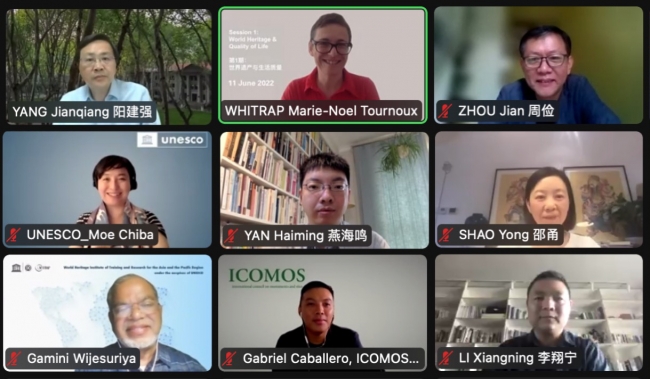| Summary | 1st WHITRAP World Heritage Dialogue |
| Author:Marie-Noël TOURNOUX, SHAO Yong PublishDate:2022-06-24 Hits:7053 |
See the Calendar of the World Heritage Dialogues series: http://www.whitr-ap.org/index.php?classid=1461&newsid=3310&t=show
Group Photo
The first of the six monthly WHITRAP Shanghai World Heritage Dialogues, was launched on 11 June on the occasion of China’s Heritage Day. Its focus was World Heritage and Quality of Life. For the video of the activity, please visit: http://heritap.whitr-ap.org/index.php?classid=12497&id=29&t=show
This first Dialogue session, was divided in three parts, an opening ceremony, an introduction followed by two keynote speeches and a round table.
The Dialogue was launched by Prof. LI Xiangning, Dean of the College of Architecture and Urban planning (CAUP), Tongji University, by Jyoti HOSAGRAHAR, Deputy Director of UNESCO’s World Heritage Centre(by pre-recorded video presentation) and by Prof. ZHOU Jian, Secretary General of WHITRAP and Director of WHITRP Shanghai.
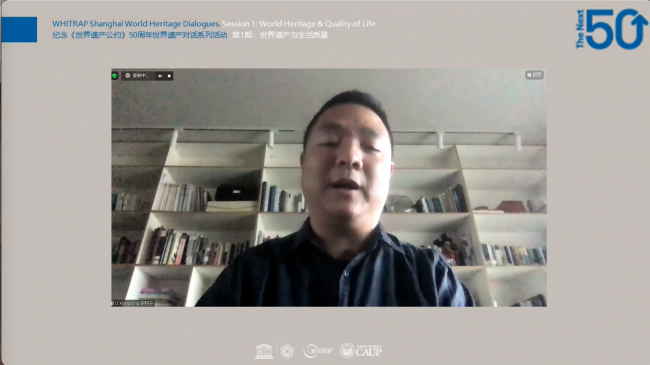 Prof. LI Xiangning, Dean of the College of Architecture and Urban planning, Tongji University
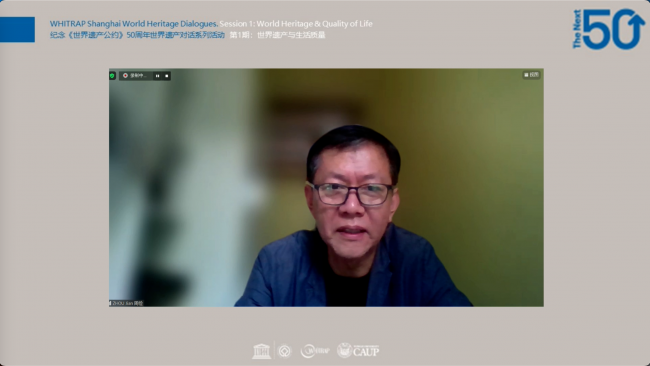 Prof. ZHOU Jian, Secretary General of WHITRAP and Director of WHITRP Shanghai
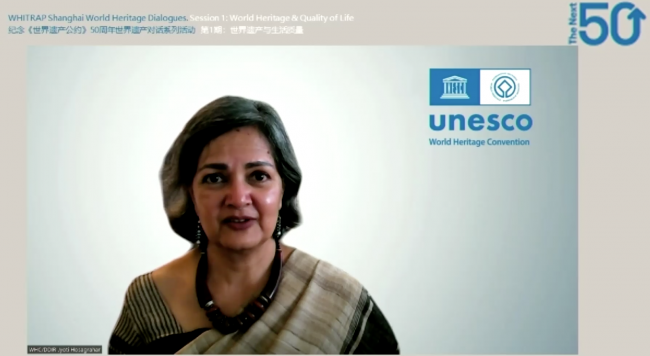 Jyoti HOSAGRAHAR, Deputy Director of UNESCO’s World Heritage Centre
The opening speeches were followed by an introduction to the theme of the 1st Dialogue, by Marie-Noël TOURNOUX, Project Director at WHITRAP Shanghai and Prof. SHAO Yong, College of Architecture and Urban Planning (CAUP), Tongji University. They provided background information on the linkage between heritage and development and emphasized how sustainability and liveability were embedded in the World Heritage Convention.
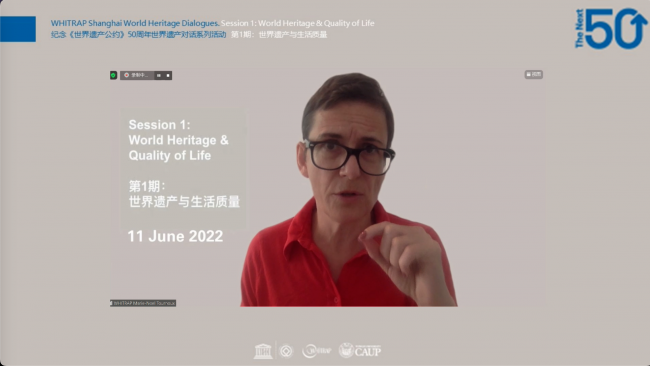 Marie-Noël TOURNOUX, Project Director at WHITRAP Shanghai
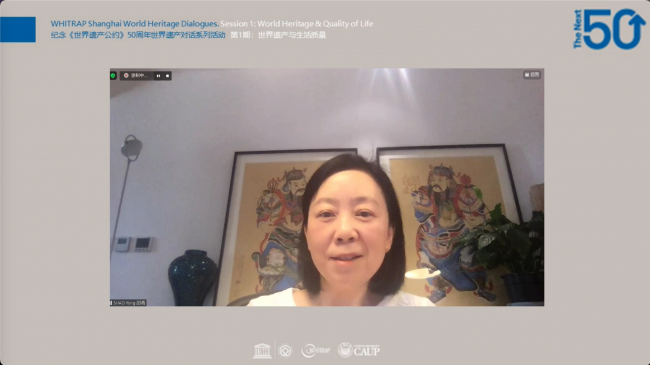 Prof. SHAO Yong, College of Architecture and Urban Planning (CAUP), Tongji University
Two keynote speeches followed the introduction. Jyoti HOSAGRAHAR, Deputy Director of the World Heritage Centre, UNESCO emphasized the links between World Heritage and Sustainable Development (by pre-recorded video presentation), whilst Gabriel CABALLERO, ICOMOS Philippines & ICOMOS Focal Point for the SDGs focused on 50 years of World Heritage: Quality, Quantity and Sustainability of Sites in the World Heritage List. (The summaries of the two keynote speeches will be published online.)
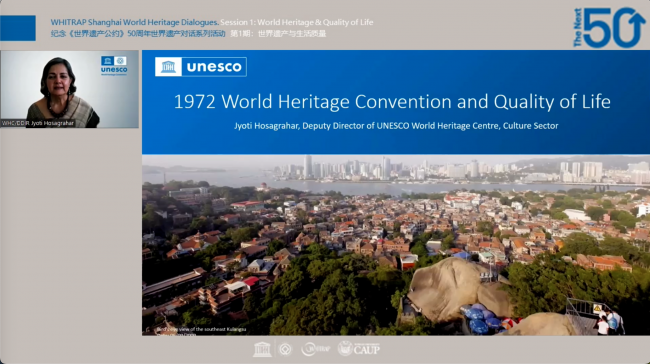 Keynote speech 1: World Heritage and Sustainable Development, by Jyoti HOSAGRAHAR
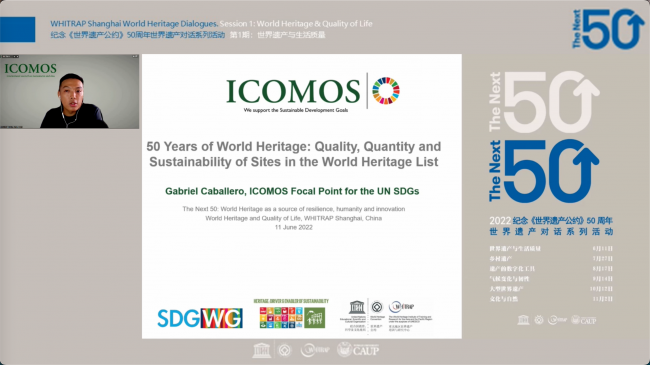 Keynote speech 2: 50 years of World Heritage: Quality, Quantity and Sustainability of Sites in the World Heritage List, by Gabriel CABALLERO
The roundtable discussion was moderated by Prof. SHAO. The following experts participated in the Round Table discussion, Gabriel CABALLERO, Moe CHIBA, Chief of Culture Unit at the UNESCO Jakarta Office, Prof. YANG Jianqiang, School of Architecture at Southeast University, Nanjing, Dr. Gamini WIJESURIYA, WHITRAP Special Advisor, Dr. YAN Haiming, Director of ICOMOS China Secretariat, Associate Research Fellow and Deputy Director of China World Cultural Heritage Center, participated in the Round Table discussion.The moderator invited the discussants to reflect on two questions: According to the characteristics of World Heritage in the Asia-Pacific region, what are special and distinctive aspects on the topic of World Heritage and quality of life? What are the specific difficulties or challenges? Correspondingly, are there any good approach to highlight Re-reading the World Heritage Convention today and looking at the next 50 years, what must be maintained and what should be modified? 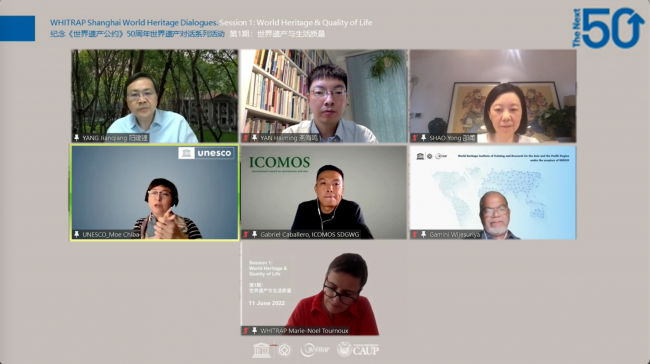 Round Table
The Dialogues allowed for lively and knowledge-sharing roundtable discussions among the experts from the Asia and Pacific region. They showcased experiences from the region and discussed the conservation and management of World Heritage sites, the strength and relevance of the Convention, and the ways to achieve a better linkage between conservation and development. Three key points came out of the roundtable discussion: The universal value of the World Heritage Convention needs to be strengthened. For example, more emphasis should be placed on the spiritual meaning of World Heritage. Heritage should be brought into people’s everyday life and be people-centered. The adoption of new digital and virtual means, although useful, should not diminish the spiritual meaning of “World Heritage”. The spirit of international cooperation of the World Heritage Convention needs to be revived. The Convention stems from an international campaign to safeguard humankind’s heritage based on international cooperation. This original intention is what we need to adhere to and pass on in the next 50 years to collectively face the social, economic, Climate Change challenges and other threats. The diversity of heritage types and innovative protection methods are important. Heritage types are more and more diverse, they express a wider and richer range of heritage and they are becoming closer to the quality of people's lives. Therefore, protection and conservation methods need more innovative and people-centred approaches to recognize that our heritage and we are inseparable as a whole. The outcomes of the Dialogue, as well as the video recording, will be summarized and posted online and shared on 15-16 November on the occasion of the International Conference “World Heritage and Urban-Rural Sustainable Development: Resilience and Innovation”.
Relevant Links: http://heritap.whitr-ap.org/index.php?classid=12497&id=34&t=show
Contributed by Marie-Noël TOURNOUX, SHAO Yong
Edited by ZHANG Xinyi
|
- Call for Application | 2024 Global Awards for World Heritage Education Innovative Cases(AWHEIC) Promoting what people do and how they do it
- Documentary: 2023 World Heritage Creative X Innovators Conference and the AWHEIC Third Anniversary Celebration
- Publication | WHITRAP Newsletter No. 61
- Mt. Huangshan first show in Climate Action for World Heritage
- Call for Good Practices: 2024 Environment and Resilience
- FAQs | 2024 Call for Good Practices
Copyright © 2009-2012 World Heritage Institute of Training and Research-Asia and Pacific (shanghai)


